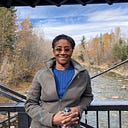Thank you for your thoughtful response, Chris. While I have lived with this rage most of my life, I have released it and allowed myself to move on. And I’ve never felt happier or more productive with my life. This is what I would like other black Americans to understand: living with anger consumes us like cancer, and in the end, we suffer far more than the targets of our rage.
Regarding your thoughts on incremental process at an “excruciatingly slow” pace: as I mentioned in my article, we’ve been here before. Blacks were similarly disillusioned fifty-five years ago because the progress we had made over the previous century had been virtually non-existent. But King put it into perspective in a way I believe only he could:
Only ten years earlier, Mississippi blacks had to step into the gutter to let a white person pass on the sidewalk; ten years later, they could move freely through streets. Before, if they wanted to meet as a group, they would have to come together in the woods at night as conspirators; thanks to the efforts of the movement, they could now meet publicly and loudly. Perviously, they weren’t allowed to enter the Southern legislature unless they were a chauffeur or porter; now they 11 had joined Georgia’s House of Representatives. All of this happened in only 10 years. In other words, King was telling us that in a relatively short amount of time, blacks had gone from being invisible to visible.
So if King were alive today, what would he have to say about where we are now?
Would he notice that the targets of our rage seem far less inclined to resist black equality openly and defiantly — and are legally and publicly shamed for doing so — and that they even congratulate themselves for “valuing diversity” in their business hiring? Would he notice that interracial dating is no longer taboo — with the number of multiracial children tripling in the last 35 years — and that people like you have proudly created families with black spouses (please correct me if I’m wrong about your wife’s race)? Would he notice that Hollywood is finally putting more faces of color in front of and behind the camera? Would he notice that black business owners, athletes and celebrities have become social icons and built multi-million and billion dolalr financial empires? That a black person like me could be admitted to Princeton and Harvard Law School with scores of other people of color? That a black woman served as the country’s National Security Advisor, a black man served as its Secretary of State, and another black woman served as both? Or most of all, would he notice that 43% of white Americans elected a black man to lead our country — not once, but twice? What would he have to say about the fact that all of these things have transpired in the span of a little more than two generations?
Here’s what I think King would say if he were alive today: change sometimes unfolds so gradually we can’t see it; it seems excruciatingly slow because we take for granted how far we’ve come and where we started. Because transforming the minds and hearts of human beings is a slow, grinding, multi-generational effort. It’s a process of human evolution, not a lot unlike an amphibian morphing to life as a land-based animal. I think he would tell us that the line of progress is never straight, but as long as we keep moving forward we will eventually reach our goal.
Chris, I beg that you please consider the possibility that we are being encouraged to think we have made less progress than we actually have, because holding these thoughts keeps us fighting each other instead of fighting the very thing that is not only holding blacks back from moving forward more, but is also causing vast numbers of white people to slip behind with us. Please consider the possibility that we are being purposefully divided in order to make it easier for the uber-wealthy to loot the remaining wealth in this country and around the globe, without our mobilized and conscious awareness.
Don’t be distracted. Don’t allow yourself to be divided from the people who can be your allies. I’m a black woman living in Montana among a generous heap of Trump-loving white people, and I have found so many brothers and sisters up here, my friend. If that can happen to me, please trust there is still hope for us, regardless of what you see, hear, or read on the nightly news or in social media.
We are living in a fake reality.
